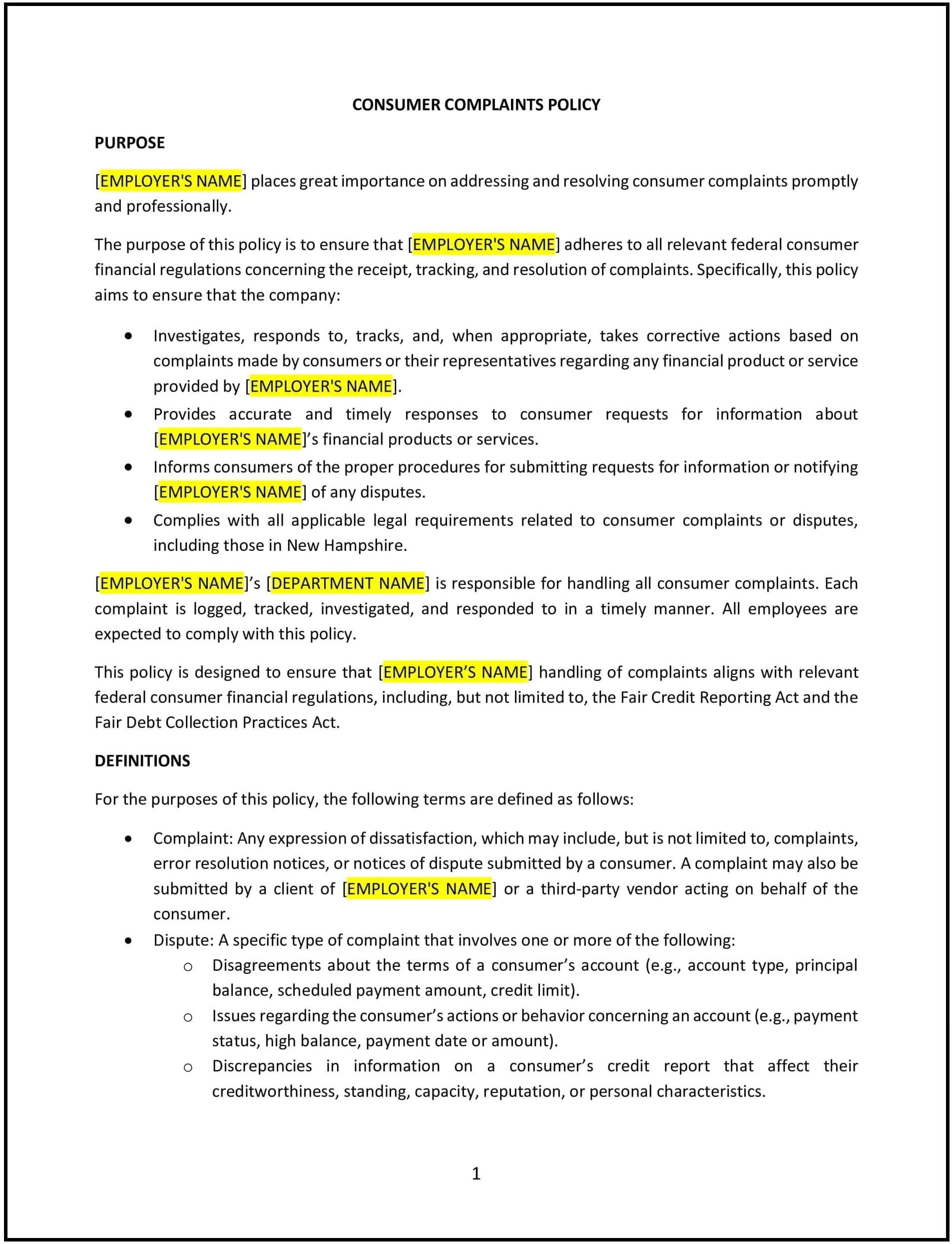Consumer complaints policy (New Hampshire): Free template
Got contracts to review? While you're here for policies, let Cobrief make contract review effortless—start your free review now.

Customize this template for free
Consumer complaints policy (New Hampshire)
A consumer complaints policy helps New Hampshire businesses address customer feedback, complaints, and disputes in a systematic and professional manner. This policy outlines the process for customers to submit complaints, how those complaints will be reviewed, and the steps taken to resolve them.
By adopting this policy, businesses in New Hampshire can build customer trust, improve customer satisfaction, and resolve issues efficiently while maintaining positive relationships with their clients.
How to use this consumer complaints policy (New Hampshire)
- Define the scope of the policy: Specify the types of complaints that the policy covers, such as product defects, customer service issues, billing disputes, or delivery problems.
- Set up reporting channels: Provide clear and accessible channels for consumers to submit their complaints, such as an email address, phone number, or online form.
- Outline the complaint review process: Define how complaints will be reviewed, including the timeline for acknowledging receipt, investigating the issue, and determining an appropriate resolution.
- Establish resolution steps: Specify the steps for resolving complaints, such as issuing refunds, offering replacements, or providing discounts, depending on the nature of the complaint.
- Protect consumer privacy: Ensure that personal information provided by consumers during the complaint process is kept confidential and handled in accordance with privacy laws.
- Address the role of employees: Outline how employees should respond to complaints, ensuring they are trained to handle issues professionally, empathetically, and in a timely manner.
- Provide feedback mechanisms: Explain how customers will be informed of the resolution of their complaints and whether any follow-up is needed to ensure satisfaction.
- Review and update: Regularly review the policy to ensure it aligns with New Hampshire regulations and business needs, updating as necessary to improve customer service and resolve complaints effectively.
Benefits of using this consumer complaints policy (New Hampshire)
This policy provides several benefits for New Hampshire businesses:
- Enhances customer satisfaction: A clear and efficient complaints process helps businesses address consumer issues promptly, improving overall satisfaction and loyalty.
- Protects business reputation: By handling complaints professionally, businesses can prevent negative reviews or legal disputes, protecting their reputation in the marketplace.
- Promotes continuous improvement: Tracking and resolving consumer complaints can provide valuable insights into areas of improvement, helping businesses refine their products, services, and operations.
- Encourages customer feedback: Providing a structured way for customers to voice their concerns encourages open communication, allowing businesses to address issues proactively.
- Reduces legal risks: Addressing consumer complaints effectively can help prevent legal claims or disputes that may arise from unresolved issues.
Tips for using this consumer complaints policy (New Hampshire)
- Communicate the policy clearly: Ensure that all employees are aware of the consumer complaints policy and understand how to respond to customer issues in a timely and professional manner.
- Make the complaints process accessible: Provide consumers with multiple ways to submit their complaints, such as through email, a web form, or by phone, ensuring that the process is easy to use.
- Respond promptly: Acknowledge complaints quickly and provide an estimated timeline for resolution, showing the customer that their issue is being taken seriously.
- Document all complaints: Keep a record of all complaints, including the nature of the issue, the resolution process, and any follow-up, to track trends and improve service.
- Review the policy regularly: Update the policy as needed to reflect changes in business practices, customer feedback, or New Hampshire regulations, ensuring that it remains effective and efficient.